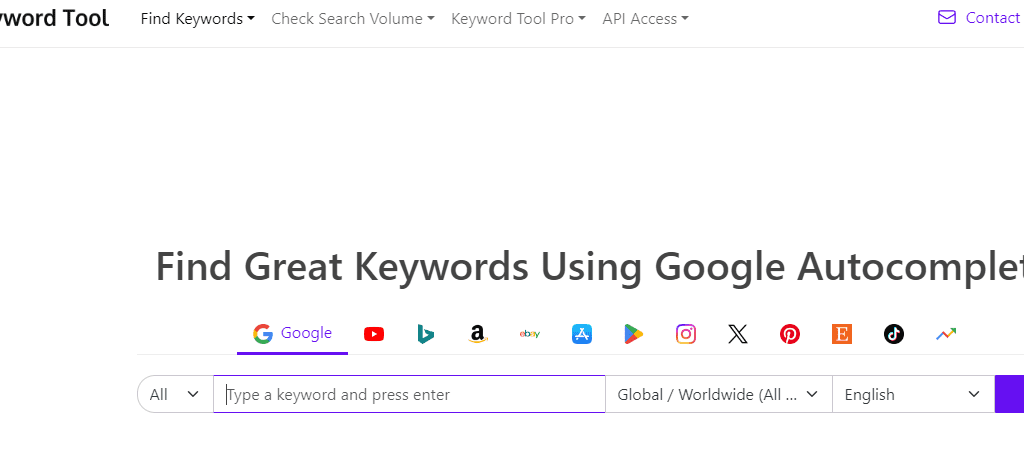
Introduction
Understanding “How Many Keywords Should I Use for SEO” is essential for effectively optimizing your content. Striking the right balance of keywords can boost your search engine rankings and attract relevant traffic.
In this blog post, we’ll explore the importance of keyword usage, common mistakes to avoid, and best practices to help you get the most out of your SEO efforts. Whether you’re a beginner or looking to refine your strategy, this guide will provide valuable insights to enhance your SEO approach.
Table of Contents
Understanding SEO Keywords
In the world of SEO, keywords are essential. These are the terms and phrases people use in search engines to find information, products, or services. Understanding SEO keywords and their role is crucial for improving your website’s visibility and ranking.
Definitions and Types of SEO Keywords
SEO keywords are terms or phrases that capture the essence of your website’s content. They help search engines match your site with relevant search queries. There are various types of SEO keywords:
- Short-tail Keywords: These are one or two words long and cover broad topics, like “shoes” or “marketing.” They have high search volumes but are very competitive.
- Long-tail Keywords: These are longer, more specific phrases, like “best-running shoes for women” or “digital marketing tips for small businesses.” They have lower search volumes but higher conversion rates because they are more specific.
- LSI Keywords: Latent Semantic Indexing (LSI) keywords are related terms that help search engines understand the context of your content. For example, for the keyword “apple,” LSI keywords could be “fruit,” “recipes,” or “nutrition.”
The role of keywords in SEO
Keywords are vital in SEO because they connect what people are searching for with the content you provide. Here’s why they matter:
- Relevance: Keywords help search engines understand how relevant your content is to a user’s query, improving your chances of ranking higher.
- Traffic: Targeting the right keywords can increase organic traffic to your site, as you’re providing what users are looking for.
- Conversion: Using specific keywords that match user intent can lead to higher conversion rates, as your content meets their needs more precisely.
Importance of Keyword Research
Conducting keyword research is essential for successful search engine optimization (SEO). It helps you identify the words and phrases people use in search engines, ensuring your content meets their needs. Let’s dive into why keyword research is essential and how it relates to our focus keyword, “How Many Keywords Should I Use for SEO?”

What is keyword research?
Keyword research involves finding and analyzing the search terms people use online. This helps you understand what your audience is looking for and how to create content that matches their queries. A common question that arises in this process is, ‘How many keywords should I use for SEO?’ By addressing this, you can optimize your content more effectively.
Why is keyword research important?
- Understanding User Intent: Researching keywords helps you know what your audience wants, allowing you to create content that satisfies their search intent.
- Improving Search Rankings: Using the right keywords helps search engines see your content as relevant, boosting your rankings on search results pages.
- Driving Targeted Traffic: Focusing on specific keywords attracts visitors who are genuinely interested in your content, leading to higher-quality traffic.
- Optimizing Content Strategy: Knowing popular keywords helps you plan and create engaging SEO-friendly content.
- Gaining a Competitive Edge: Analyzing competitors’ keywords reveals opportunities to improve your own strategy and stand out.
How Many Keywords Should You Use for SEO?
Determining the right number of keywords to use in your content is a crucial aspect of search engine optimization (SEO). The focus keyword “How Many Keywords Should I Use for SEO” is essential for understanding this balance. Here’s a clear and concise guide on how to find the optimal number of keywords for your SEO strategy.
Factors to consider
When deciding how many keywords to use, consider these key factors:
- Content-Length: The length of your content influences the number of keywords you can effectively incorporate. Longer articles can naturally include more keywords without feeling stuffed.
- Content Relevance: Ensure your keywords are relevant to the topic. Using unrelated keywords can harm your SEO efforts and confuse your readers.
- Competition: High-competition keywords might require a more strategic approach, including more long-tail keywords to stand out.
- User Experience: Keywords should enhance, not detract from, the readability of your content. Prioritize a natural flow over keyword density.
Recommended Number of Keywords
While there isn’t a universal solution, here are some general tips to follow:
- Primary Keyword: Focus on one primary keyword per page or post. This should be the main topic of your content.
- Secondary Keywords: Include 2-3 secondary keywords that are closely related to your primary keyword. These help cover related search queries and improve your content’s reach.
- LSI Keywords: Use Latent Semantic Indexing (LSI) keywords to provide context and depth. These are terms related to your primary keyword that help search engines understand your content better.
Balancing Keywords
Finding the right balance is key. Excessive keyword usage (keyword stuffing) can result in penalties from search engines. Instead, aim for natural integration.
- Title and Headings: Ensure your main keyword is present in the title and at least one heading.
- Introduction and Conclusion: Use your primary keyword in the introduction and conclusion to reinforce the main topic.
- Body Content: Distribute secondary and LSI keywords throughout the body content, maintaining a natural and readable flow.
Are Too Many Keywords Bad for SEO?
When it comes to SEO, the number of keywords you use can significantly impact your website’s performance. The focus keyword “How Many Keywords Should I Use for SEO” is central to understanding this balance. Let’s explore why using too many keywords can be detrimental to your SEO strategy.
Keyword Stuffing: A Major Pitfall
Keyword stuffing involves cramming a webpage with too many keywords in an attempt to manipulate its search engine rankings.This tactic can backfire for several reasons:
- Search Engine Penalties: Search engines like Google have advanced algorithms that can detect keyword stuffing. Websites caught using this tactic can be penalized, leading to lower rankings or even removal from search results.
- Poor User Experience: Content that is stuffed with keywords often reads poorly and can be off-putting to users. This can result in higher bounce rates as visitors leave the site quickly, which negatively impacts your SEO.
- Diluted Content Quality: Overusing keywords can dilute the quality of your content, making it less informative and engaging. High-quality content should be your primary focus, with keywords naturally integrated.
Best Practices to Avoid Keyword Stuffing
- Seamlessly Incorporate: Make sure keywords blend smoothly into your sentences. Avoid forcing keywords into places where they don’t belong.
- Content Quality: Focus on creating high-quality, valuable content. Keywords should enhance your content, not control it.
- Monitoring and Adjusting: Use SEO tools to monitor keyword performance and make adjustments as needed to maintain a natural keyword density.
Best Practices for Using Keywords
Using keywords effectively is crucial for SEO success. Here are the best practices for optimizing your content with the focus keyword, “How Many Keywords Should I Use for SEO?”
Keyword Placement
- Title: Include your primary keyword in the title to help search engines and users identify your content’s main topic.
- Headings: Use your primary keyword in at least one heading (H1, H2, etc.) to highlight its importance.
- Introduction and Conclusion: Mention your primary keyword in the introduction and conclusion to reinforce your main topic.
- Body Content: Distribute your primary and secondary keywords naturally throughout the text to maintain a smooth flow.
Keyword Density
Aim for a keyword density of about 1-2%, meaning your primary keyword should appear once or twice for every 100 words. When asking “How Many Keywords Should I Use for SEO,” it’s important to also incorporate secondary and LSI keywords for additional context and variety.
Synonyms and related terms
Incorporate synonyms and related terms to enhance relevance and avoid overusing the primary keyword. This makes it easier for search engines to understand the main points of your material, particularly when considering how many keywords should i use for SEO.
Meta Descriptions and Alt Text
- Meta Descriptions: Use your main keyword in the meta description to boost click-through rates.
- Alt Text for Images: Use keywords in the alt text of images to help search engines understand the image content and improve accessibility.
Internal and external links
- Internal Links: Link to other relevant pages on your site using anchor text that includes your keywords.
- External Links: Link to high-quality external resources related to your keywords for added credibility.
Tools to Help Manage and Optimize Keywords
Managing and optimizing keywords is essential for effective SEO. The focus keyword “How Many Keywords Should I Use for SEO” can guide you in using the right tools. Here are some top tools to help you optimize your keywords efficiently:.
Google Keyword Planner
Google Keyword Planner is a free tool that offers keyword ideas and search volume data, helping you identify relevant keywords and determine how many to use for SEO.
SEMrush
SEMrush provides keyword research, competitive analysis, and keyword tracking. It helps you find keywords, analyze competitors’ strategies, and track your rankings.

Ahrefs
Ahrefs provides comprehensive keyword analysis, covering search volume, keyword difficulty, and related terms. It also includes a content gap analysis to identify opportunities.

Moz Keyword Explorer
Moz Keyword Explorer helps you discover and prioritize the best keywords with suggestions, SERP analysis, and insights into keyword difficulty.

Ubersuggest
Ubersuggest provides keyword ideas, content suggestions, and competitive analysis, helping you find long-tail keywords and optimize your content.

Keyword Tool
Keyword Tool generates long-tail keyword suggestions using Google Autocomplete data, making it ideal for SEO, PPC, and content creation.

AnswerThePublic
AnswerThePublic visualizes search queries and offers keyword ideas by showing what questions people are asking about your primary keyword.
Common Mistakes to Avoid
Knowing how many keywords to use for SEO is crucial, but there are common mistakes to avoid. Here are some key pitfalls:
Keyword Stuffing
Overloading content with keywords, known as keyword stuffing, can lead to penalties and poor readability. Use keywords naturally and focus on high-quality content.
Ignoring user intent
Don’t focus solely on keywords without considering user intent. Ensure your keywords match what your audience is searching for.
Using Irrelevant Keywords
Stick to relevant keywords that match your content topic and the audience’s search intent. Using irrelevant keywords can make it difficult for search engines and readers to understand your content.
Overlooking long-tail keywords
Long-tail keywords attract targeted traffic. Incorporate these specific phrases to capture niche audiences and improve your ranking chances.
Neglecting keyword research
Thorough keyword research is essential. Use tools like Google Keyword Planner, SEMrush, and Ahrefs to find the best keywords for your content.
Ignoring keyword placement
Include keywords in the title, headings, intro paragraphs, and conclusion. Distribute secondary keywords naturally throughout the content.
Focusing only on high-competition keywords
Balance your strategy with a mix of high-, medium-, and low-competition keywords to increase your chances of ranking.
Not updating keywords
SEO trends change over time. Keep your keywords up-to-date to remain relevant and ahead of the competition. Monitor performance and adjust your strategy as needed.
Conclusion
Understanding how many keywords to use for SEO is essential for optimizing your content effectively. By following best practices, avoiding common mistakes, and using the right tools, you can improve your search engine rankings and attract more relevant traffic.
Focus on integrating keywords naturally, researching thoroughly, and considering user intent. Regularly update your strategy to stay current with SEO trends.
With these strategies in place, you’ll enhance your content’s relevance and visibility, driving better results for your SEO efforts.
FAQs
1. What’s the ideal number of keywords to use for effective SEO?
Use your main keyword about 1-2% of the time in your content, which means once or twice per 100 words. Add secondary keywords naturally for better context.
2. Why is keyword density important?
Keyword density helps search engines understand your content’s relevance. However, overusing keywords can hurt readability and rankings. Balance is key.
3. What are long-tail keywords, and why should you use them?
Long-tail keywords are detailed phrases that draw in a more specific and targeted audience. They help you reach niche audiences and can be less competitive, improving your ranking chances.
4. How do I choose the right keywords?
Utilize tools such as Google Keyword Planner, SEMrush, and Ahrefs to discover keywords that have strong search volume. Pay attention to what your audience is looking for to find the most relevant terms.
5. What mistakes should I avoid with keywords?
Avoid keyword stuffing, using irrelevant keywords, and neglecting long-tail keywords. Make sure to use keywords naturally and keep your content user-focused.




